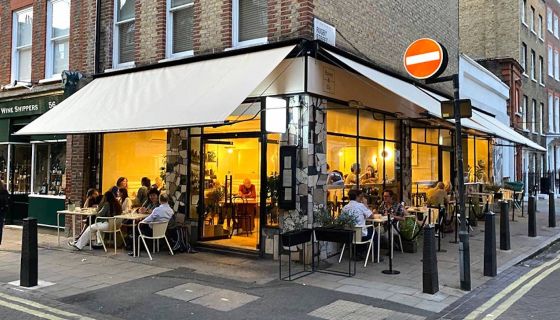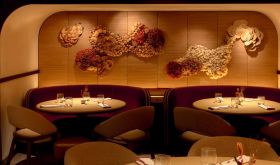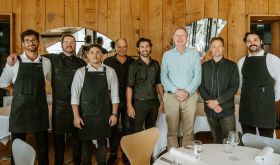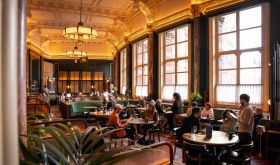I appreciate that this may sound somewhat premature as there are still four Saturdays before the New Year officially gets underway, but today marks the beginning of the run-up to 2023. I don’t know how many of you will agree with me, but the next few weeks of December mark a short season that I would describe as the ‘restaurant no go’ period.
Many of the bookings for December will be given over to Christmas celebrations and the essence of many restaurants will change accordingly – not just their decorations but culturally even more. Speed will be of the essence as kitchens and waiting staff accommodate larger tables and even more merriment while customers have even more fun. And restaurants, they hope, will make enough money to see them through the much quieter first quarter of 2023.
For several years my reaction to this phenomenon has been to ignore it and quietly to turn my professional back on restaurants until early January. It is an approach I intend to continue this December. And then, from 1 January, I resolve to adopt a new approach to eating out.
This will be to follow an example I have now tried three times recently with great success. And, if my reading of the state of the British economy is correct, and the depressing impact this will have on London’s restaurants is as predicted, then I will probably be able to continue this regime at least until Easter 2023. It is this: not to book a table in advance but just to turn up. To become a casual ‘walk-in’ – a tactic that may well work in other countries.
The first of my three recent London experiences was when we were walking back to King’s Cross early one evening and decided to try our luck at Supawan, a favourite Thai restaurant on Caledonian Road (with a strong connection to the impressive Aflorum flower shop next door). I still remember a feeling of slight nervousness as we stood by the receptionist and explained that we did not have a reservation. And then I recall her smiling at us and saying the magic words, ‘Of course, please follow me’, which we did and were seated at a table with a view.
We ate and drank well – I had a couple of Singha beers, actually – as well as a beef-cheek curry cooked in a massaman sauce thickened with potatoes and peanuts – and we chatted as customers like to do. But I felt that there was something more, that we had done well. We had won, in a fashion. We had got into the restaurant, at a time that suited us. We had been made very welcome. And we had a good time.
Part of the pleasure lay in not having to battle with any online reservation system. Please don’t get me wrong. I like them and as someone who spends most of his working day at a laptop, I admire their convenience (and if I were still a restaurateur, I would definitely use one). But I dislike their lack of flexibility. Too often the most popular booking times are routinely blocked off when in reality they are not actually booked. At the new St John in Marylebone recently I tried to book for 1.30 pm but was told there were no tables available. I was allowed to book for 2 pm but turned up early, just after 1.30, expecting to wait. But there were several tables available, including ours where we enjoyed the famous St John minimal experience, but in the West End. The deep-fried, very cheesy rarebit, lamb broth and Eccles cakes with Lancashire cheese made for a satisfying Saturday lunch.
The third highly enjoyable meal as a ‘walk-in’ took place early one evening last week at the recently opened Honey & Co on Lamb’s Conduit Street (pictured above courtesy of Hot Dinners), where I had tried and failed to book online a few weeks ago. En route from a wine tasting to the new Korean film Decision to Leave (not recommended), we wandered down the street initially planning to go to Noble Rot opposite. But the opportunity to try somewhere new beckoned and we walked in – to the same, extremely warm welcome and the same standard of good food as the original Honey & Co in Warren Street. We enjoyed a spiced pumpkin falafel, and a dish of slow-cooked chicken and figs with a glass each of two fascinating wines: Lyrarakis Liatiko 2021 Cretan red and Maia Mare 2020 Rhôneish red from Israel. And, best of all, their feta and honey cheesecake with almonds and blueberries on a base of kadaif (shredded filo pastry) – food for the spoon, the fingers and the spirit.
This is a practice I intend to continue over the coming three to four months when the post-Christmas and New Year rush is over. No one, either in retail or hospitality, is too confident of likely demand in this quarter. Traditionally, it has always been much quieter than the year-end, and next year is looking even more depressing than usual.
There are a number of reasons for this, most of them readily available on every front page. There is inflation; rising energy prices which will affect customers’ spending and restaurateurs’ costs; the sharp rise in food prices coupled with the declining value of the pound, which will add to everybody’s eventual bill, with higher costs especially for wine. The small silver lining for restaurateurs is that the weakening pound should, at least, continue to make London, and the rest of the UK, highly attractive to overseas visitors. (The seven-course menu exceptionnel at the Waterside Inn in Bray, for instance, is priced at £235, or just under €270; a similar menu at Maison Troisgros in Ouches, south-east France, there called menu au gré de la lumière, costs €340).
On top of the expected drop in demand during the first quarter of 2023, there is one other additional factor to be considered. Over the past 15 years, the number of restaurants of every description in the UK has increased significantly as hospitality, in the broadest sense of the term, was initially seen as an adjunct to retail. But more recently, as retail has faltered under the effect of first online shopping and then COVID, hospitality has been seen as a replacement for failing retail.
Consequently, a large number of what were once retail spaces have been converted by their landlords into spaces that can accommodate hospitality, the biggest and most obvious change being the installation of an extract to allow for the requirements of a busy kitchen. Numerous landlords in our major cities have put up the required capital to transform a considerable proportion of their portfolio to allow this change of use. As a result there are today far more potential restaurant seats available than there used to be.
They are available to everyone, but in particular for anyone, like me, who cares to ‘walk in’ – without a reservation.
Supawan 38 Caledonian Road, King’s Cross, London N1 9DT
St John, Marylebone 98 Marylebone Lane, London W1U 2QA
Honey & Co, Bloomsbury 54 Lamb’s Conduit Street, London WC1N 3LW
Jancis adds We’d love to hear about your experiences of simply walking in to a reasonably popular restaurant without a booking. I’ve started a ‘Walking in’ thread on the forum where we'd love to have you share your experience of this technique.














